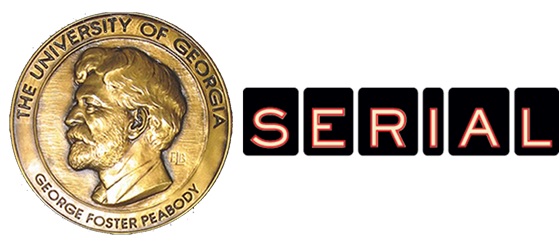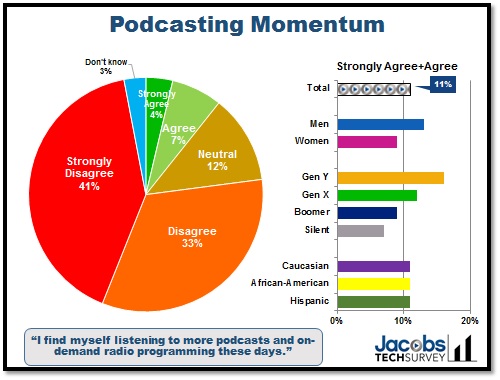So the good news is that the wildly successful public radio podcast Serial has just nabbed a highly respected Peabody Award. That makes it the first podcast to pull that off.
And that’s also the bad news, because now the Serial team may be feeling the pressure to recreate that success. At more than 77 million downloads, Serial has singlehandedly put podcasting back on the radio broadcasting map, spawning many new business plans and lots of homegrown efforts centered around on-demand audio.
NPR’s Invisibilia is going through a similar process. Debuting in January, its 6-episode run has far-exceeded the expectations of NPR management, winding up both on the air (at 300+ affiliate stations) and garnering 33 million downloads in podcast form.
A recent article in The Hollywood Reporter talked about the growing buzz around podcasting. And as mentioned in an earlier post on podcasting, everyone’s getting into the act. Norm Pattiz acknowledged at RAIN last week that “Podcasting owes a debt to Serial that can never be repaid.” And he’s right because now the entire world of radio is thinking about podcasting – as a creative outlet and a business model.
But of course this also means that the floodgates will open and we’re going to hear a lot of really bad podcasts. Not to mention that everyone in radio seems to be name-dropping Serial in the same way that new tech startups always invoked the names Steve Jobs and Apple.
So as impressive as Serial has been, Peabody and all, there are a couple of catches to keep in mind about this platform.
First, podcasting is still not a mass appeal entertainment form. In our newly released Techsurvey11, 21% of the total 41,600+ sample told us they’d listened to a podcast in the past month. That’s not a bad number, but it isn’t an indicator that podcasts are something that the vast majority of audio fans are consuming.
And right now today, we don’t see a great deal of momentum for podcasting. Just one in ten of our respondents (11%) says they’re listening to more of this on-demand programming.
While we see signs in TS11 that Sports fans, in particular, listen to podcasts, the platform has a long way to go if it’s going to make a lot of people rich and provide another way for broadcasters to create another programming and revenue stream.
The public radio world is a different story, because it has had more experience in the space. In just a few weeks, we’ll be investigating podcasting in our Public Radio Techsurvey7 as we sample audiences from a projected 50+ group of stations.
Of course, the second caveat revolves around the gnarly issue of content creation.
No speed bumps, yellow lights, or early warning systems will stop floods of DJs, stations, companies, and entrepreneurs from jumping in with both feet. As the teams at both Serial and Invisibilia will tell you, however, creating worthy content in this space is no easy task.
For inspiration – and for perspective – think about what’s going on in television. As it has turned out, video – from regular TV to YouTube to Netflix – became one of the focal points of Techsurvey11. And for good reason. The ways in which people consume video are rapidly changing – moving from linear viewing using a traditional programming schedule for real-time viewing – to an on-demand, whenever/whatever format.
We are experiencing a true renaissance of amazing television programming powered by a strong desire by Netflix and other networks and brands to pour billions of dollars into creating their own proprietary shows. Time-shifted viewing has forever changed the game, allowing upstarts like Netlfix and YouTube to challenge the traditional broadcast and cable networks. Everyone involved in TV and video has upped their games.
Would-be podcasters should take note.
I have had countless dinners in the past couple of years where my companions started talking about their favorite TV shows and series – and the next thing you know, an hour has gone by. It is remarkable just how much fabulous programming is available on TV/video, to a point where most of us simply don’t have the time to keep up with all these great shows and series. Starting perhaps with The Sopranos and moving to Homeland and then Game of Thrones, The Walking Dead, and Mad Men, and followed by the instant release of entire seasons of House of Cards, And soon the term “binge watching” entered our lexicon and our lives.
These fundamental changes in the way we consume video programming is stunning. The Interactive Advertising Bureau reports that half of connected TV owners are more apt to stream their favorite programming than watch traditional TV. And in the case of video producers and content creators, they are now attracting the biggest celebrities and stars to their TV series. Amazingly, you don’t hear people talking enthusiastically about movies in the same way they’re now gushing about television. That’s truly a first.
Could it happen in radio? It all starts with shows and programs that are worthy of our leisure time and that have the ability to generate buzz.
And that takes us back to radio and podcasting. What’s happening with television viewing proves there’s the potential for radio listeners to consume audio content in an on-demand mode – and I don’t mean jukebox pure-plays. But hard lessons from the television camp also show that shoddily produced shows aren’t worth downloading and viewing at one’s convenience. Not every show or series is Downton Abbey and the failures and misfires abound. There would be few takers for a Garfunkel & Oates marathon.
That’s the lesson of Serial and probably why its producers may have fist-bumped when they heard the Peabody news. And then an hour later started wondering how in the world they can do it again.
Television has set a high bar. And in the same way that radio programmers had to re-evaluate everything in the ‘50s when TV sets starting landing en masse into virtually every home in America, that burden once again falls on radio executives seeking to cash in on podcasting.
Anyone can produce a podcast just like anyone can produce a YouTube video.
Producing great programs that will captivate the imaginations and interest of thousands of consumers isn’t going to come from simply repurposing content that has already aired or from a couple of people sitting around in a studio no longer worrying about bowtie stopsets or throwing around F-bombs.
If radio is to realize its podcasting potential and to truly take advantage of its talent and brands, it will require a detailed strategy, significant investment, and lots of time. Those are elements that have not been plentiful in recent years.
As Pattiz admitted, the industry owes a mega-thank-you to the producers and creators of Serial. And now a hearty congratulations.
But to produce a real winning audio platform is going to require more than just talking about it.
You don’t win a Peabody by slapping together schlock programming and calling it a podcast.
As is the case with all media, content isn’t king – it’s everything.
Podcasting done well is hard work.
- Why “Dance With Those Who Brung You” Should Be Radio’s Operating Philosophy In 2025 - April 29, 2025
- The Exponential Value of Nurturing Radio Superfans - April 28, 2025
- What To Do If Your Radio Station Goes Through A Midlife Crisis - April 25, 2025






Truer words were never spoken. I think media exec’s who come strictly from sales think of Serial more as the hot item like red sneakers than hard work. If it is hot, we’ll just switch to red and join the crowd. But in actuality, it is more like Javier Sotomayor, who cleared just over 8 feet in the high jump in 1993. His record still stands. Serial was a super-human effort. How long will its record stand? IMO, a lot longer than most media execs drooling over podcasts think. The group that produced Serial did not start in this business yesterday. Building that kind of expertise and the cross-promotion NPR was able to give that project is not inherent in every media company now looking to produce podcasts.
Amen. Thanks for the comment and very on-point observations. When will the next Peabody be given out for the best podcast? It could be a while.
Good piece – I replied. Let’s keep the podcasting conversation going.